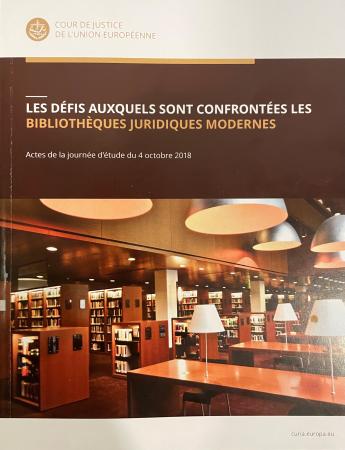New publication: Les défis auxquels sont confrontées les bibliothèques juridiques modernes: Actes de la journée d’étude du 4 octobre 2018, Luxembourg, Cour de Justice de l’Union européenne. Direction de la bibliothèque, 2021.
This publication is the result of the Study Day of October 4, 2018, organized by the Library of the Court of Justice of the European Union in the aftermath of the 37th IALL Annual Course on International Law and Legal Information, Luxembourg, September 30 to October 3, 2018. This blog represents a short summary of the discussions held during this day, extracted from parts of this publication.
The one-day program at the Library of the Court of Justice of the European Union that followed IALL 2018 was opened by Justice Koen Lenaerts, who was just re-elected President of the CJEU on October 9, and was followed by an all-star cast of speakers, including the Law Librarian of Congress, Jane Sánchez. The speakers primarily addressed the challenges facing modern law libraries: for example, the increasing globalization of legal practice; the proliferating diversity of source formats; the skyrocketing costs of legal materials; and the increasing prominence of other disciplines in legal practice and research. The conference itself was bilingual (French/English), and two teams of three interpreters each provided simultaneous translations.
The questions raised during the conference suggest shared concerns by law librarians from institutions all over the world. This dialogue on topics of common interest was based on four observations.
The first observation is the significant digitisation of books and periodicals, which - for a library - is both an opportunity and a challenge. The electronic format of publications is flexible for all users to use because it is available 24/7 and limits storage costs. But its use by libraries is often very expensive because of the cost of expensive user licenses. In addition, unlike paper format, which is perpetually available to the library, in the event of bankruptcy of a database provider, electronic resources may be very difficult to recover. Copyright is another complex subject that may undergo a major evolution. In this regard there's an absolute need for a new legal framework adapted to libraries to combat certain practices of suppliers or publishers. The creation of 'creative common licences' could help to promote the dissemination of open access knowledge.
And so we turn to the second observation of the dialogue, the multiplication of resources called 'open source/open access' or 'free access'. We can all see the multiplication of open access legal resources, i.e. content put online by its author without going through a legal publisher. However, this raises the issue of resource reliability. These new open sources, disseminated without control, present risks, particularly for the less experienced lawyers. New criteria have to be identified to ensure the quality of these online contributions.
The third observation is the evolution of IT tools. The progress made in information science is impressive and vast. Libraries are certainly not immune to this observation. It is essential to clearly identify the tools necessary for libraries to function properly. The installation of these high-performance tools may require redefining the tasks of library staff when IT tools replace part of their daily work. With regard to online bibliographic research, things are changing very quickly due to technological progress.In this regard, we must learn from the behaviour of legal researchers, in particular young researchers as they are more familiar with developments in computer technology.
Another important aspect of the evolution in information technology is the use of discovery tools that often use data from thesauri of legal publishers or reference libraries in combination with traditional library catalogues that provide fairly accurate reference rankings, including journal articles. These discovery tools can be considered as kind of 'conciliation' of traditional search and search in Internet search engines. The main advantage is that the researcher has a single point of access to a large number of sources. Often, they also provide direct access to the full text. Access to the full text must be considered as a decisive step forward for libraries.
The fourth and last observation is the need to strengthen collaboration between libraries. Library networks can make it possible to combine the strengths of each individual library, thus contributing to a better dissemination of information and a greater strength in negotiations with suppliers.
This publication is available in the Peace Palace Library.
